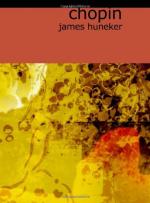The Paris of 1831, the Paris of arts and letters, was one of the most delightful cities in the world for the culture-loving. The molten tide of passion and decorative extravagance that swept over intellectual Europe three score years and ten ago, bore on its foaming crest Victor Hugo, prince of romanticists. Near by was Henri Heine,—he left Heinrich across the Rhine,—Heine, who dipped his pen in honey and gall, who sneered and wept in the same couplet. The star of classicism had seemingly set. In the rich conflict of genius were Gautier, Schumann, and the rest. All was romance, fantasy, and passion, and the young men heard the moon sing silvery—you remember De Musset!—and the leaves rustle rhythms to the heart-beats of lovers. “Away with the gray-beards,” cried he of the scarlet waistcoat, and all France applauded “Ernani.” Pity it was that the romantic infant had to die of intellectual anaemia, leaving as a legacy the memories and work of one of the most marvellous groupings of genius since the Athens of Pericles. The revolution of 1848 called from the mud the sewermen. Flaubert, his face to the past, gazed sorrowfully at Carthage and wrote an epic of the French bourgeois. Zola and his crowd delved into a moral morass, and the world grew weary of them. And then the faint, fading flowers of romanticism were put into albums where their purple harmonies and subtle sayings are pressed into sweet twilight forgetfulness. Berlioz, mad Hector of the flaming locks, whose orchestral ozone vivified the scores of Wagnerand Liszt, began to sound garishly empty, brilliantly superficial; “the colossal nightingale” is difficult to classify even to-day. A romantic by temperament he unquestionably was. But then his music, all color, nuance, and brilliancy, was not genuinely romantic in its themes. Compare him with Schumann, and the genuine romanticist tops the virtuoso. Berlioz, I suspect, was a magnified virtuoso. His orchestral technique is supreme, but his music fails to force its way into my soul. It pricks the nerves, it pleases the sense of the gigantic, the strange, the formless, but there is something uncanny about it all, like some huge, prehistoric bird, an awful Pterodactyl with goggle eyes, horrid snout and scream. Berlioz, like Baudelaire, has the power of evoking the shudder. But as John Addington Symonds wrote: “The shams of the classicists, the spasms of the romanticists have alike to be abandoned. Neither on a mock Parnassus nor on a paste-board Blocksberg can the poet of the age now worship. The artist walks the world at large beneath the light of natural day.” All this was before the Polish charmer distilled his sugared wormwood, his sweet, exasperated poison, for thirsty souls inmorbid Paris.




